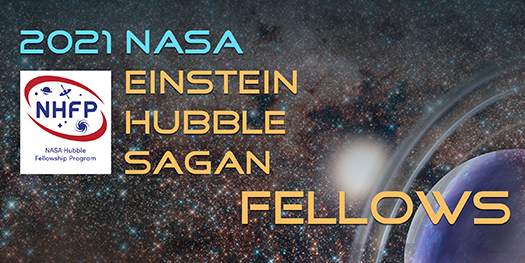For Release: March 31, 2021
NASA

NASA has selected 24 new Fellows for its prestigious NASA Hubble Fellowship Program (NHFP). The NHFP is one of the highlights of NASA's pursuit of excellence in astrophysics. The program enables outstanding postdoctoral scientists to pursue independent research in any area of NASA Astrophysics, using theory, observation, experimentation, or instrument development. Over 400 applicants vied for the fellowships. Each fellowship provides the awardee up to three years of support.
Once selected, Fellows are named to one of three sub-categories corresponding to three broad scientific questions NASA seeks to answer about the universe:
- How does the universe work? — Einstein Fellows
- How did we get here? — Hubble Fellows
- Are we alone? — Sagan Fellows
"The annual selection of NASA Hubble Fellows always fills me with hope," said Paul Hertz, Director of Astrophysics at NASA Headquarters in Washington. "These outstanding young scientists are the future of astrophysics, and their impact on our understanding of the cosmos will be felt for decades to come."
The newly selected NHFP Fellows will begin their programs in the fall of 2021 at a university or research center of their choosing in the United States. The list below provides the names of the 2021 awardees, their fellowship host institutions, and their proposed research topics.
2021 NASA Hubble Fellowship Program:
How does the universe work? — Einstein Fellows:
- Kishalay De, Massachusetts Institute of Technology, Unveiling the Local Stellar Graveyard
- Sara Issaoun, Smithsonian Astrophysical Observatory, Connecting Black Hole Shadows to Multi-Wavelength Accretion and Outflow Physics
- Mikhail Ivanov, Institute for Advanced Study, Fundamental Cosmology from Galaxy Clustering
- Lea Marcotulli, Yale University, Unveiling the Hidden Connection Between Supermassive Black Holes and Jet Triggering Mechanisms
- Ariadna Murguia-Berthier, Northwestern University, The Study of Hyper-Accreting Black Holes and the Origin of Gold in the Universe
- Antonella Palmese, University of California, Berkeley, Gravitational Wave Cosmology Through the Eyes of Dark Energy Experiments
- Anowar Shajib, University of Chicago, Internal Structure of Massive Elliptical Galaxies: The Missing Piece at the Intersection of Astrophysics and Cosmology
- Alexandra Tetarenko, Texas Tech University, Unraveling the Complex Nature of Black Holes and How They Power Explosive Outflows with Time-Domain Observations
How did we get here? — Hubble Fellows
- Kirk Barrow, Harvard University, High-Cadence Radiative Transfer Modeling on Galactic Scales
- Pradip Gatkine, California Institute of Technology, Probing the CGM-Galaxy Connection Using Multi-Object Spectroscopy and Astrophotonics
- Michael Grudic, Carnegie Observatories, Star Formation Physics from Cosmos to Cores
- Thales Gutcke, Princeton University, Linking ISM Physics and Galaxy Formation
- Erika Holmbeck, Carnegie Observatories, The R-Process Refinery: Distilling Stellar Signatures to Characterize the Astrophysical Production Site of the Heavy Elements
- Sinclaire Manning, University of Massachusetts, Amherst, Revealing Optically Invisible Dusty Star-Forming Galaxies in the Early Universe
- Viraj Pandya, Columbia University, Towards a Fully Predictive Standard Model of Galaxy Formation
- Melinda Soares, University of Wisconsin, Madison, Devoured Worlds — The Signatures of Substellar Ingestion
- Catherine Zucker, Space Telescope Science Institute, Knitting Together the Milky Way: Tracing Gas Flows in the Era of Big Data
Are we alone? — Sagan Fellows
- Marta Bryan, University of California, Berkeley, The Celestial Movers and Shakers: Gas Giant Planets Provide Key Insights into the Formation Histories of Exoplanet Systems
- Megan Mansfield, University of Arizona, Steward Observatory, Atmospheres as Windows to the Diversity of Extrasolar Planets
- Diana Powell, Smithsonian Astrophysical Observatory, Origins: Relating Protoplanetary Disks to Planetary Atmospheres
- Raluca Rufu, Southwest Research Institute, A New Paradigm for Compact Exoplanetary System Origin
- Jake Turner, Cornell University, Studying Exoplanetary Magnetic Fields Using Radio and High-Resolution Spectropolarimetry Observations
- Luis Welbanks, Arizona State University, High-Definition Exo-Atmospheric Characterization with Transit Spectroscopy
- Jon Zink, California Institute of Technology, Expanding Exoplanet Demographics to Identify Key Components of Planet Formation
An important part of the NHFP are the Symposia, which allow Fellows the opportunity to present results of their research, and to meet each other and the scientific and administrative staff who manage the program. A lively and very successful virtual symposium was held in the fall of 2020, and organizers are waiting to make a decision on whether the 2021 symposium will be virtual or in-person.
The Space Telescope Science Institute administers the NHFP on behalf of NASA, in collaboration with the Chandra X-ray Center at the Smithsonian Astrophysical Observatory in Cambridge, Massachusetts, and the NASA Exoplanet Science Institute at Caltech/IPAC in Pasadena, California.
Short bios and photos of the 2021 NHFP Fellows can be found at:
http://www.stsci.edu/stsci-research/fellowships/nasa-hubble-fellowship-program/2021-nhfp-fellows.
Media Contact:
Christine Pulliam
Space Telescope Science Institute, Baltimore, Maryland
410-338-4366
cpulliam@stsci.edu


